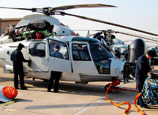
By Piet Marais CAPE TOWN, Feb. 25 (Xinhua) -- The establishment of a BRICS development bank has been prominent in discussions taking place in the build-up to the 5th BRICS Summit to be held in Durban next month.
It is widely expected that the summit can give a long-awaited institutional underpinning to the grouping.
South African Standard Bank's Simon Freemantle, Senior Analyst in the African Political Economy Unit, and Jeremy Stevens, an international economist based in Beijing, said in their latest report in Africa Macro that the BRICS development bank is an agenda item which is sure to feature strongly in Durban at the summit scheduled for March 26-27, guided by the theme "BRICS and Africa -- partnerships for integration and industrialisation".
According to the report available to Xinhua on Monday, the details around the BRICS bank are expected to emerge. The main ambition of the bank will be to direct development in a manner that reflects the BRICS priorities and competencies.
Therefore, the bank will focus on infrastructure development and providing auxiliary support for project preparation such as feasibility studies. Later, a working group will be tasked with establishing the necessary technical commitments and governance structures.
Seen against the background of flourishing BRICS trade with Africa as the pivot, there is diplomatic and commercial momentum to which the bank can add an institutional foundation.
"The proposed bank contributes constructively to the development of more robust and inter-dependent ties between the BRICS members," the report states.
The member states -- Brazil, Russia, India, China and South Africa -- are expected to dig deep into their pockets to make the bank work.
Referring to pragmatic issues that require resolution, including the funding source, Freemantle and Stevens say they expect each of the five member states to initially contribute 10 billion U. S. dollars in seed capital. The bank would then borrow from global capital markets, becoming a non-resident borrower in the United States, Europe, Hong Kong and elsewhere.
Other pragmatic issues Freemantle and Stevens refer to are whether the private sector will contribute to the seed capital, the types of projects that will be launched, the geographical reach, where the bank headquarters will be and many others.
"Unless pragmatically managed, strains will emerge and a highly visible failure would be damaging for the nebulous assembly," the report says.
"The bank is not a counterweight to multilateral development banks -- notably the World Bank. The dominance of the US and Europe in Bretton Woods Institutions is acknowledged as a source of contention for BRICS. However, on this specific score, the envisioned BRICS bank is an auxiliary funding institution -- albeit more aligned to BRICS' development agenda," say Freemantle and Stevens.
















 Have you been absent during your children's childhood?
Have you been absent during your children's childhood?


![]()
